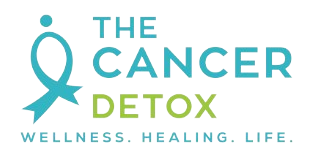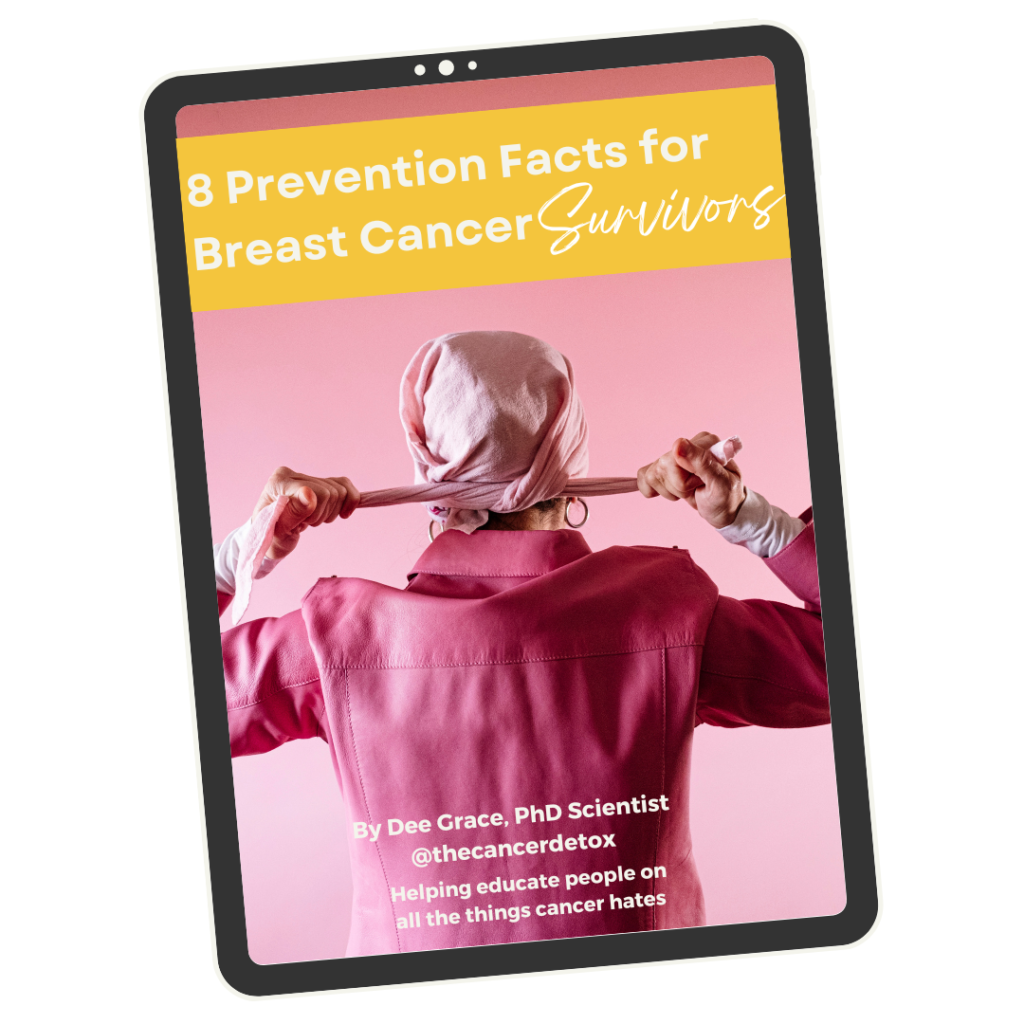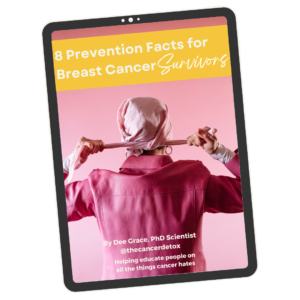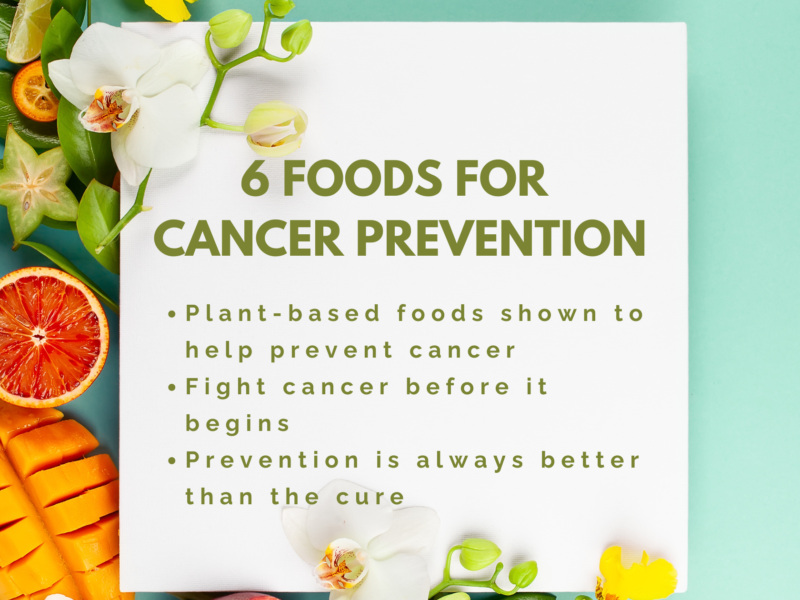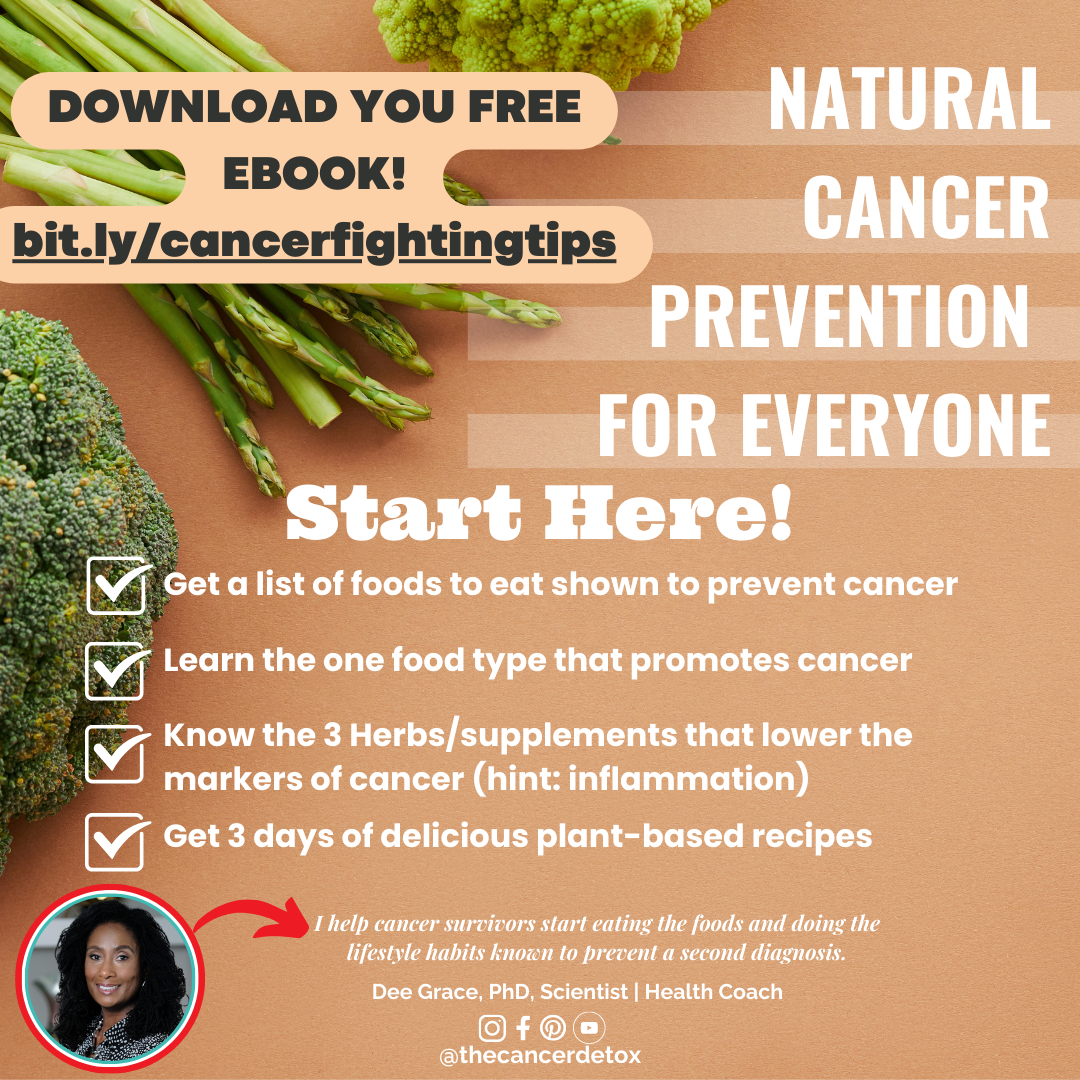
This Breast Cancer Diet Increases Survival in Breast Cancer Survivors
Many of our breast cancer clients ask, “What does the science say are the best foods to eat to increase my chances of survival?” The answer is quite simple: a breast cancer diet should consist of lots of vegetables, fruits, and doing another self-care activity that we’ll discuss in this article.

A breast cancer diet should consist of lots of vegetables and fruit.
In this article, you will learn:
- Why VEGETABLES and fruits should be part of your breast cancer diet! Eating 5 servings a day lowers the risk of death due to breast cancer. Five servings of vegetables and fruit a day seems to do the trick (read more below)
- Click here to download our FREE eBook “8 Prevention Facts for Breast Cancer Survivors” which includes 8 facts on how a breast cancer diet and lifestyle lowers the risk of a recurrence. It also includes 3-days of healthy, plant-based recipes.
INTRODUCTION
With an ever-growing number of breast cancer cases in the United States (approximately 297,000 per year), breast cancer is now the most frequently diagnosed cancer [1]. There are well over 4 million breast cancer survivors in the U.S., which includes those actively being treated and those who have ended treatment [2]. The focus of the healthcare system now is on helping breast cancer survivors thrive after treatment has ended. That includes preventing a second breast cancer diagnosis.
Many of our breast cancer survivor clients come to us to create a health transformation after their diagnosis. Whether they want to become plant-based or more physically active, they use our health coaching service to make lasting changes. And we always tell them the things that breast cancer hates, which is vegetables. They should be the basis of any breast cancer diet.
However, vegetables cannot be the only thing breast cancer survivors rely on because a holistic game plan for preventing cancer should encompass multiple healthy habits. The two main habits I want breast cancer survivors to consider are eating vegetables and fruits, as well as exercising because the science convincingly shows they have a lower risk of a second breast cancer diagnosis.
However, these two habits are some of the hardest things for survivors to accomplish consistently. Only half of breast cancer survivors report getting at least 9 metabolic equivalent tasks (MET) -h/week, which equals 30 min of walking daily. And when it comes to healthy eating, again, only half of survivors say they eat at least 5 daily servings of vegetables and fruits [3].
RESEARCH ON BREAST CANCER DIET AND SELF-CARE ACTIVITIES
So, when researchers asked 1490 women, with an average age of 50 years, diagnosed with early-stage breast cancer to go through a study looking at how the combination of vegetables, fruits, and exercise affected their risk of death after beating their initial breast cancer diagnosis, the results provided some guidance on what women should do.
Here are some of the characteristics of the women diagnosed with breast cancer seen in this trial:
- 40% were stage I
- 45% were stage II
- 15% were stage III
- The majority were taking tamoxifen
- All were cancer-free, as determined by an oncologist
- The women were within 4 years of diagnosis, with an average time from diagnosis to the study analysis being 8.7 years
The women were asked to provide the amount of vegetables and fruits (V-F) they ate over several weeks. In this analysis, the researchers decided to exclude V-F with low nutritional value: iceberg lettuce, white potatoes, and low-nutrition fruit juices. They also gathered the amount of physical activity (PA) they had, with 3 METs being mild activity, 5 METs being moderate, and 8 METs being vigorous.
5 SERVINGS OF VEGETABLES & FRUITS, PLUS DAILY VIGOROUS WALKING, INCREASES LONG-TERM SURVIVAL RATES
The researchers found that women with high daily V-F intake who also had high PA had a 10-year survival rate of 93%. The 10-year survival rate was lower, 86% and 87%, for women who 1) ate low V-F a day and did high PA a day, and 2) ate high V-F and did low PA a day [3].
Eating a high amount of V-F daily and doing high PA every day reduced the mortality rate in women who were normal weight AND obese. This is a significant finding! Science has shown that women who are obese have an increased risk of both new and recurring breast cancer diagnoses [3].
When the researchers teased out the results on the effects of eating just V-F and its affect on the risk of death, they found that the more vegetables the women ate, the lower the mortality rate. Women who ate less than 3.43 servings of fruits and vegetables daily had the highest mortality rate of 12.4%. The more V-F women ate, the more decline the researchers saw in the mortality rates. This effect was seen up to eating 5 servings a day of V-F.
The researchers also looked at breast cancer receptor status (e.g., estrogen receptor status) and whether daily eating of high amounts of V-F and having high PA daily affected survivorship in comparison to women who ate a low amount of V-F and did low daily PA. They found the following:
- Estrogen receptor-positive/Progesterone receptor-positive: Women with high V-F and PA had significantly increased survival rates compared to women with low V-F intake and PA
- Estrogen receptor-positive/Progesterone receptor-negative: Significant increase in survivorship for women with high V-F and PA
- Estrogen receptor-negative/Progesterone receptor-positive: Borderline significant increase in survivorship for women with high V-F and PA
- Estrogen receptor-negative/Progesterone receptor-negative: No significant increase in survivorship, though there was a numerical increase in survivorship for women in the high V-F and PA group (~10%) compared to women in the low V-F and PA group (~13%).
AND DON’T FORGET
Click here to download our FREE eBook “8 Prevention Facts for Breast Cancer Survivors” which includes 8 facts on how a breast cancer diet and lifestyle lowers the risk of a recurrence. It also includes 3-days of healthy, plant-based recipes.
Here’s To Your Best Health!
Dee Grace, PhD

Hi! I am Dee Grace Ph.D., Scientist and Health Coach at The Cancer Detox. My career in cancer research has allowed me to work with doctors to find new treatments for this disease. I brought my scientific knowledge to The Cancer Detox to help patients get better care from their doctors during their cancer treatment process, so the focus is on improving their survival outcomes and reducing the financial burden caused by cancer treatment. If you are a cancer patient Schedule a complimentary call (click here) with me now to discuss how to reduce your financial burden and get questions every patient needs to ask their doctor (schedule soon! spots fill up quickly because I am busy researching and helping clients).
I also help people adopt a “prevention first!” mindset. Why? Because, so you don’t have to experience the long-lasting financial setbacks a cancer diagnosis causes. My new book “Cancer Prevention: Diet and Lifestyle Factors that Reduce Your Risk” focuses on cancer fighting foods and how to adopt a cancer fighting diet. Sign up for my early bird NEW BOOK list and get 50% of the book price plus my newest guide on the health benefits of Spirulina for weight loss, heart health, skin care, and eye health.
REFERENCES
[1] SEER Database: Cancer Stat Facts – Female Breast Cancer https://seer.cancer.gov/statfacts/html/breast.html.[2] American Cancer Society: Key Statistics for Breast Cancer https://www.cancer.org/cancer/types/breast-cancer/about/how-common-is-breast-cancer.html#:~:text=At%20this%20time%20there%20are,those%20who%20have%20completed%20treatment.)
[3] Pierce JP et al. Greater survival after breast cancer in physically active women with high vegetable-fruit intake regardless of obesity. J Clin Oncol. 2007;10:2345-2351
